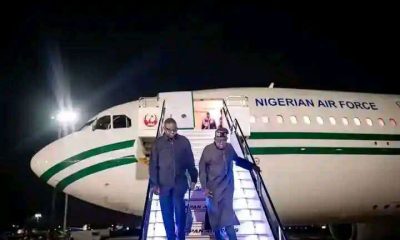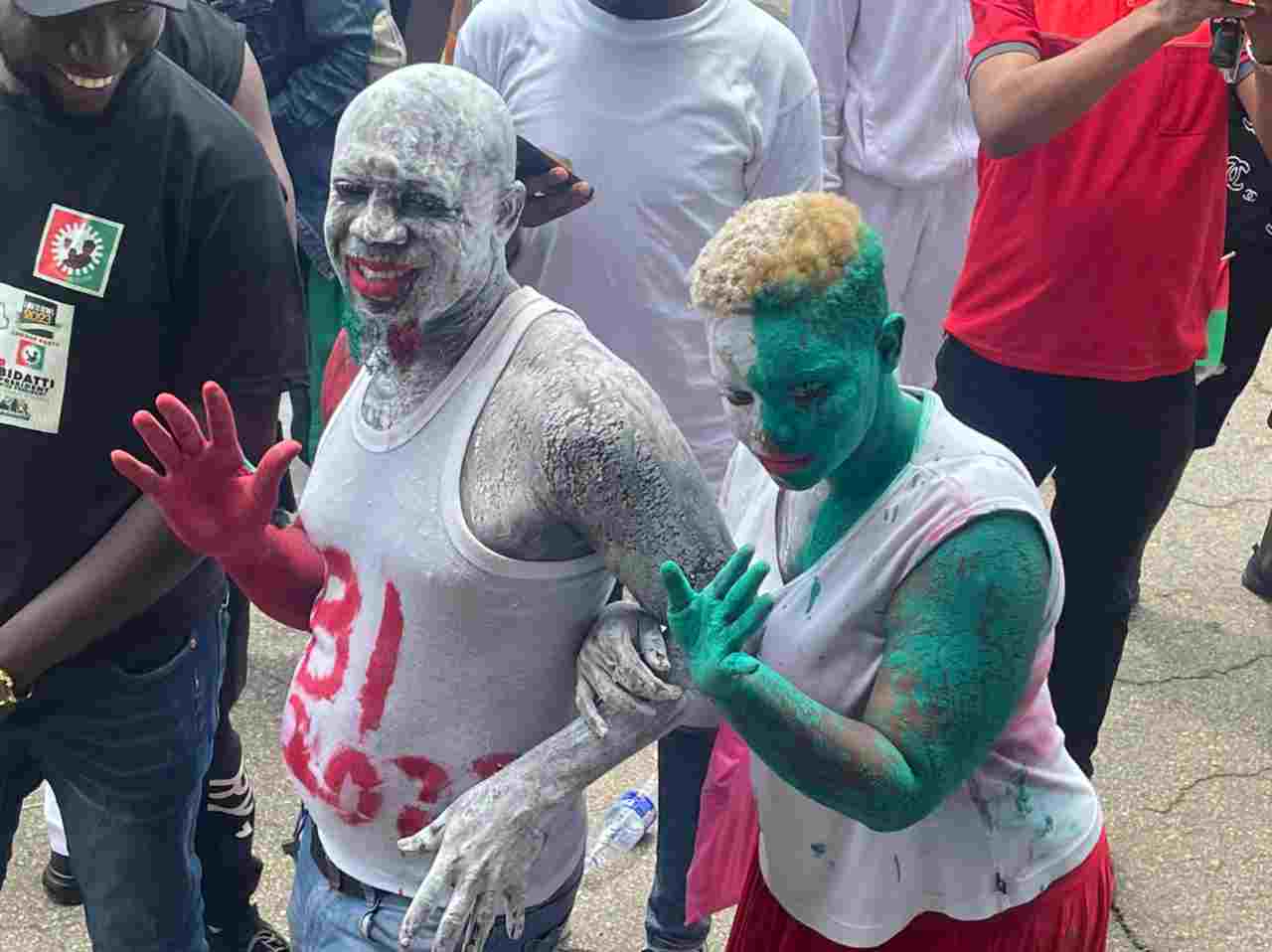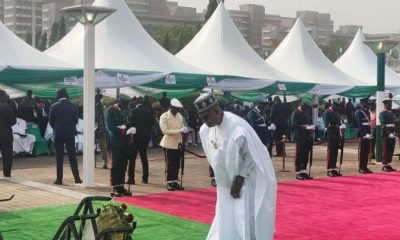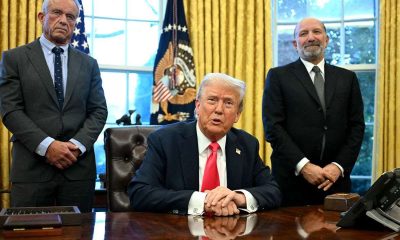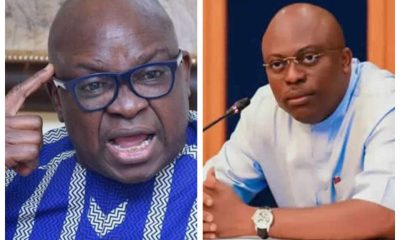Business
Lies, lies…! NNPCL in massive N2 trillion fuel subsidy scam

. State Governments kick
The controversial fuel subsidy regime purportedly scrapped by President Bola Tinubu at his inaugural speech on May 29, 2023, has bounced back in full force, with the nation blowing trillions of naira monthly on what the Nigerian National Petroleum Corporation Limited (NNPCL) prefers to call under-recovery, Business Hallmark can report.
According to BH findings and analysis, NNPCL, on behalf of the Federal Government, spends N16.48 billion daily and N494.16 billion on the 870 million litres of petrol imported monthly for local consumption.
Former Kaduna state governor, Mallam Nasir El Rufai, had in April raised the alarm by hinting that the nation had spent almost N8 trillion on subsidy since July 2023. It sounded incredulous and the Presidency, in a characteristic manner, dismissed him as a desperate and frustrated politician seeking attention. But last week, the NNPCL GMD, Mele Kyari, actually confirmed his allegations by requesting for refund of over N2 trillion from the FAAC paid ad subsidy.
Successive governments, it would be recalled, subsidized fuel for decades, literally fixing retail prices of petroleum products below their actual pump prices.
The huge financial burden, in the last two decades, impacted negatively on government’s ability to fund development projects across the nation as predicted by experts.
In the immediate past administration of former president Muhammadu Buhari, in November 2021, announced its intention to remove fuel subsidies, but had to suspend the plan after labour unions threatened to embark on nationwide protests.
The incumbent president, Bola Tinubu, speaking during his inaugural address at Eagle Square, Abuja on May 29, 2023, declared that “fuel subsidy is gone”.
According to Tinubu, funds for subsidies will be diverted to other areas like public infrastructure, education, health care and jobs.
“We commend the decision of the outgoing administration in phasing out the petrol subsidy regime, which has increasingly favoured the rich more than the poor. Subsidy can no longer justify its ever-increasing costs in the wake of drying resources.
“We shall, instead, re-channel the funds into better investment in public infrastructure, education, health care, and jobs that will materially improve the lives of millions”, the president had told the nation back in 2023.
However, available data and information obtained by BH showed that the present administration has surreptitiously reintroduced the fuel subsidy regime to avert mass protests by Nigerians already pushed to the walls by his belt-tightening policies.
On Thursday, August 8, 2023, the Minister of Finance and Coordinating Minister of the Economy, Wale Edun, informed the nation that the nation currently spends $600 million each month on fuel imports.
Edun attributed the huge petroleum import bill to neighbouring countries, as far away as Central Africa, taking advantage of Nigeria’s fuel imports.
According to Edun, Nigeria lacks accurate data on its internal fuel consumption, a situation that led to the decision of the present administration to eliminate the fuel subsidy regime.
“The fuel subsidy was removed on 29 May 2023, by Mr. President, and at that time, the poorest 40 percent were only getting four percent of the value, and basically, they were not benefiting at all. So, it was going to benefit just a few.
“Another point that I think is important is that nobody knows the actual consumption of petroleum in Nigeria.
“We know we spend $600 million to import fuel every month, but the issue here is that all the neighbouring countries are benefiting.
“So, we are buying not just for Nigeria, we are buying for countries to the east, almost as far as Central Africa.
“We are buying for countries to the north, and we are buying for countries to the west. And so we have to ask ourselves, as Nigerians, how long do we want to do that for? And that is the key issue regarding petroleum pricing”, the minister explained.
While the minister tried to clear doubts about the huge monthly import bills on petroleum products, he inadvertently confirmed the return of fuel subsidy.
Breaking down Edun’s $600million fuel import bill, Nigeria spends N494.16billion monthly on subsidizing the 870 million litres of petrol imported for local consumption at a cost of N971,790,000,000.
Based on BH findings, the landing cost of petrol was N1,118 per litre as of Wednesday, July 31, 2024. However, while the Central Bank of Nigeria’s exchange rate for foreign exchange averaged N1,570 in the last one month, the NNPCL gets FX at a discounted rate of N1,520 per dollar for fuel imports.
Further breakdown shows that at the landing rate of N1,117 per litre, the total value of the 870 million litres of petrol imported monthly is about N971,790,000,000.
However, it was learnt that NNPCL sell to major marketers, who later add their own margins at N542 (Lagos), while its retail outlets sell to motorists at N568 per litre, the cheapest in the country.
With this arrangement, Nigerians pay N477.63billion (N568 per litre) for the total 870 million litres of petrol imported monthly, while the Federal Government pays the balance of N494.16billion (N549 for every litre) through subsidy.
This translates to N11.63trillion annually, a huge drain on the nation’s scarce resources. Multiples sources in the gas and oil industry, who spoke to BH on the humongous fuel import bill, doubted NNPCL’s figures.
Minister of Finance, Wale Edun, raised dust last week when he lamented that no one knows the actual figure of petrol consumed in the country, and that the arrangement benefits only a few.
BH reliably gathered that Edun is one of the few hawks in government, who are in support of total abolition of the fuel subsidy regime.
“Edun and some powerful individuals close to the President are averse to the continuation of the subsidy regime.
“Left to people like Edun and Cardoso, (fuel) subsidy would have gone a long time ago. But the president, who is more of a politician, is not ready to pour fuel to the anger in the land and has refused to bow to pressure.
“Subsidy will continue as long as the current hardship in the land persist”, a source in government confided in our correspondent.
Meanwhile, BH learnt at the weekend that state governors, who are not happy with the current fuel subsidy arrangement are calling for its scraping.
The governors, especially the ones governing over states with low fuel consumption, had severalty complained that states with heavy consumption rates like Lagos, Ogun, Kano, Rivers and the FCT are the ones benefiting from the current arrangement.
According to a top government official in one of the states in the South West, a bill of N5 trillion annually on subsidy is unhealthy and an invitation to financial ruin.
“It is high time Nigerians accept the fact that this brazen filtering away of our God given resources is unsustainable. One day, we will wake up to find out that they are no longer there to tap. We should rather use them now to put in place infrastructure that will launch the country on the path of growth and development.
“We should rather copy gulf states like the United Arab Emirates, Qatar, and Jordan, which are not only building their countries but are also busy using their oil money to diversify into high-yielding ventures like automobile manufacturing, real estate, and sports businesses such as golf, football and car racing in Europe and America.
“The present practice of spending about one-quarter of our national budget on subsidizing fuel consumption is foolish and counterproductive. I pray we will do the needful before it is top late”, the official, who demanded anonymity, admonished.


